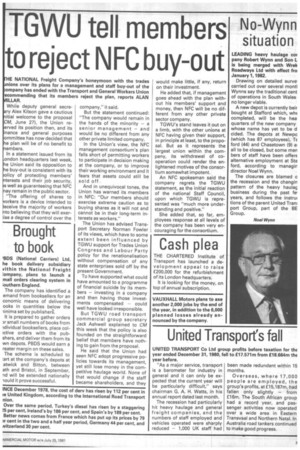TGWU tell members to reject NEC buy-out
Page 3

If you've noticed an error in this article please click here to report it so we can fix it.
HE NATIONAL Freight Company's honeymoon with the trades nions over its plans for a management and staff buy-out of the ompany has ended with the Transport and General Workers Union ecommending that its members reject the plan, reports ALAN ILLAR.
While deputy general secrery Alex Kitson gave a cautious itial welcome to the proposal CM, June 27), the Union reerved its position then, and its mance and general purposes ommittee has now decided that he plan will be of no benefit to embers.
In a statement issued from its ondon headquarters last week, he Union said its opposition to he buy-out is consistent with its olicy of protecting members' terests and their job security, s well as guaranteeing that NFC ay remain in the public sector. "The offering of shares to orkers is a device intended to .leceive the majority of workers nto believing that they will exer:ise a degree of control over the
company," it said.
But the statement continued: "The company would remain in the hands of the minority — a senior management — and would be no different from any other private limited company.
In the Union's view, the NFC management consortium's plan falls short of permitting workers to participate in decision making at the company, or to improve their working environment and it fears that assets could still be sold off.
And in unequivocal tones, the Union has warned its members in NFC: "Our members should exercise extreme caution as to buying shares as it will not and cannot be in their long-term interests as workers."
The Union has advised Transport Secretary Norman Fowler of its views, which have to some extent been influenced by TGWU support for Trades Union Congress and Labour Party policy for the renationalisation without compensation of any state enterprises sold off by the present Government.
To have supported what could have amounted to a programme of financial suicide by its members — investing in a company and then having those investments compensated — could well have looked irresponsible.
But TGWU road transport commercial group secretary Jack Ashwell explained to CM this week that the policy is also founded on the straightforward belief that members have nothing to gain from the proposal.
He said that the Union had seen NFC adopt progressive policies towards its management, yet still lose money in the competitive haulage world. None of that would change if the staff became shareholders, and they would make little, if any, return on their investment.
He added that, if management goes ahead with the plan without his members' support and money, then NFC will be no different from any other private sector company.
TGWU's stand leaves it out on a limb, with the other unions at NFC having given their support, in principle at least, to the proposal. But as it represents the largest union within the company, its withdrawal of cooperation could render the enlightened motives of the consortium somewhat impotent.
An NFC spokesman said the company regrets the TGWU statement, as the initial reaction of the national Staff Council, upon which TGWU is represented was "much more understanding and positive."
She added that, so far, employees response at all levels of the company has been very encouraging for the consortium.








































